Strategic HRM in Global Markets: A Case Study of Nokia in Bulgaria
VerifiedAdded on 2023/06/10
|9
|2247
|99
Report
AI Summary
This report examines Nokia's Human Resource Management (HRM) strategies in its Bulgarian operations, highlighting the challenges and adaptations required when expanding into a new global market. It begins by introducing Nokia and its decision to enter the Bulgarian market, driven by lower competition and potential for growth. The report then delves into Nokia's performance management system, emphasizing the importance of aligning HR practices with local rules and regulations, particularly contrasting Finnish and Bulgarian employment laws. Key performance management techniques such as 360-degree feedback, KPIs, performance appraisals, and management by objectives are discussed, with a focus on how Nokia tailors these approaches to suit the Bulgarian cultural context, including a preference for financial incentives over time off. The report also addresses common issues in managing a global workforce, such as cultural differences, communication barriers, time zone challenges, and the need for international compliance. Finally, recommendations are provided for overcoming these challenges, including conducting thorough market research, managing time zone differences effectively, hiring translators, and appointing local supervisors to ensure better control and understanding of the Bulgarian business environment. The report concludes that while global expansion offers significant opportunities, companies must adapt their HRM strategies to navigate the complexities of different cultural and legal landscapes.
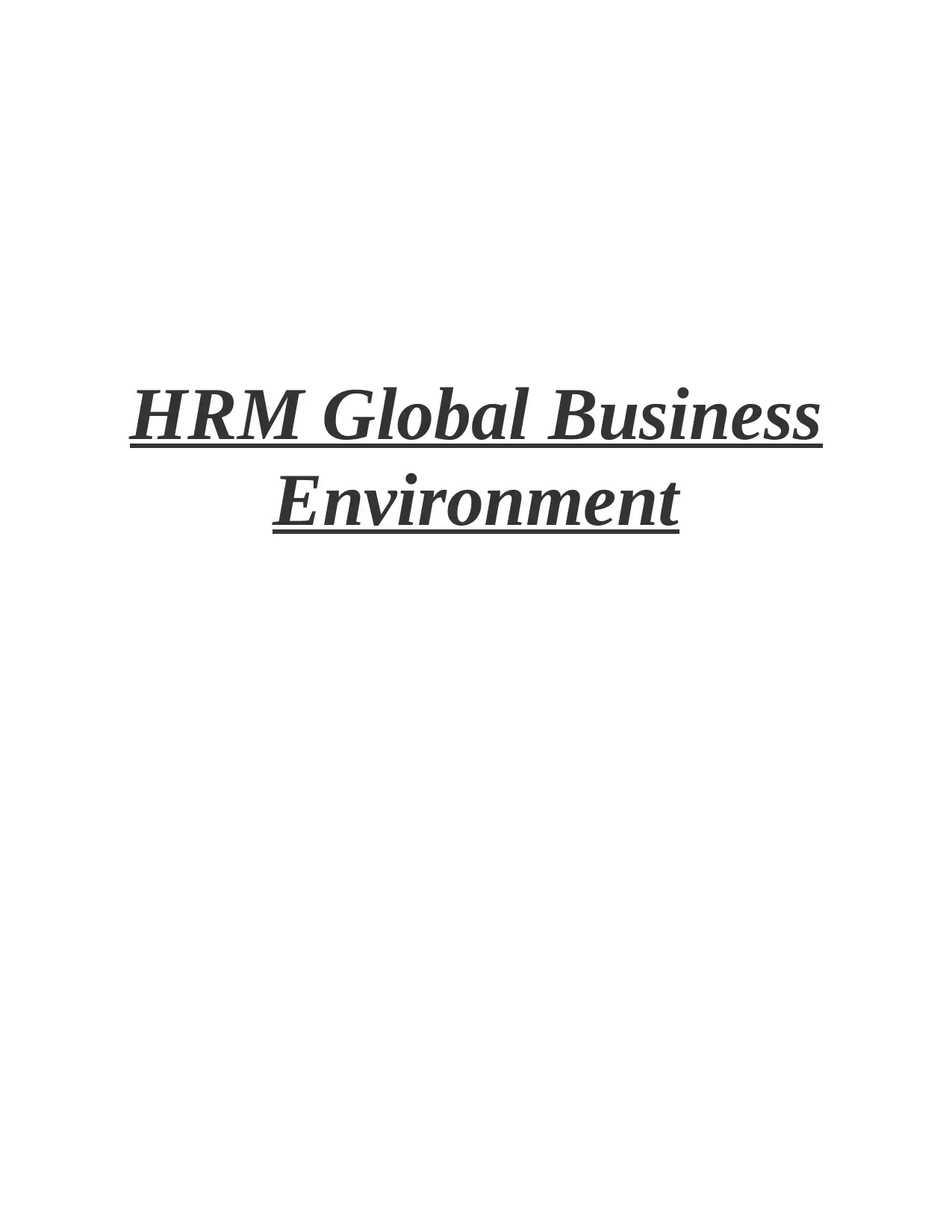
HRM Global Business
Environment
Environment
Paraphrase This Document
Need a fresh take? Get an instant paraphrase of this document with our AI Paraphraser
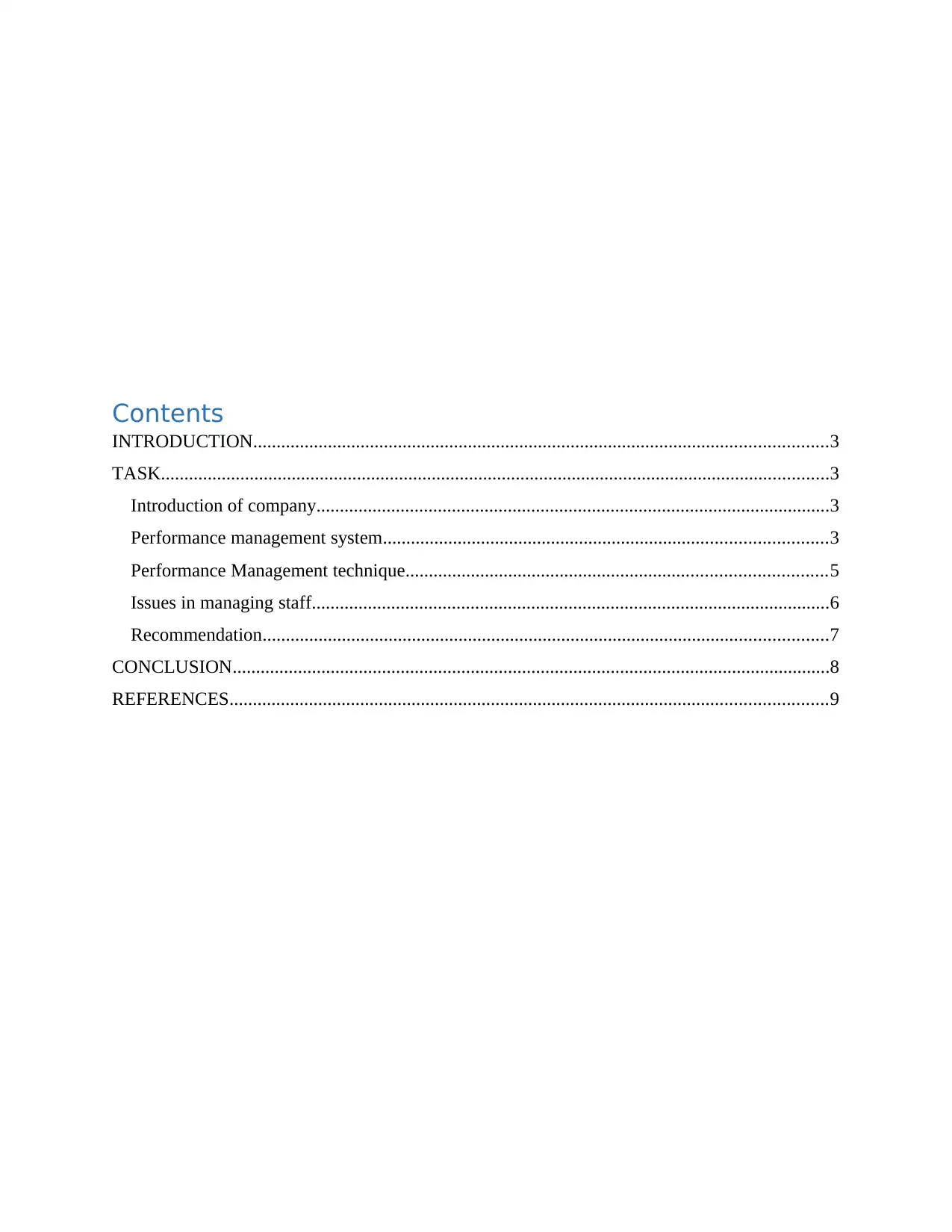
Contents
INTRODUCTION...........................................................................................................................3
TASK...............................................................................................................................................3
Introduction of company..............................................................................................................3
Performance management system...............................................................................................3
Performance Management technique..........................................................................................5
Issues in managing staff...............................................................................................................6
Recommendation.........................................................................................................................7
CONCLUSION................................................................................................................................8
REFERENCES................................................................................................................................9
INTRODUCTION...........................................................................................................................3
TASK...............................................................................................................................................3
Introduction of company..............................................................................................................3
Performance management system...............................................................................................3
Performance Management technique..........................................................................................5
Issues in managing staff...............................................................................................................6
Recommendation.........................................................................................................................7
CONCLUSION................................................................................................................................8
REFERENCES................................................................................................................................9
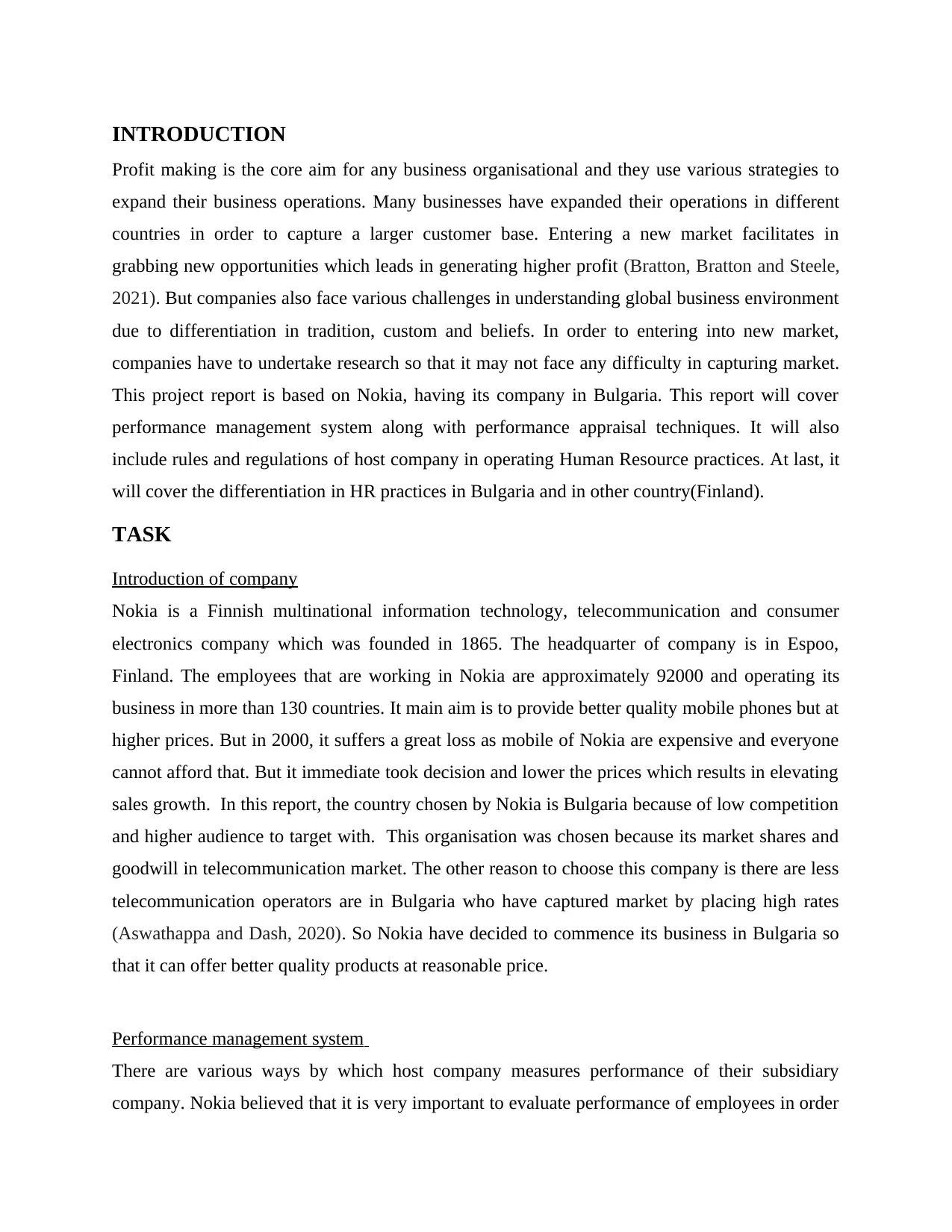
INTRODUCTION
Profit making is the core aim for any business organisational and they use various strategies to
expand their business operations. Many businesses have expanded their operations in different
countries in order to capture a larger customer base. Entering a new market facilitates in
grabbing new opportunities which leads in generating higher profit (Bratton, Bratton and Steele,
2021). But companies also face various challenges in understanding global business environment
due to differentiation in tradition, custom and beliefs. In order to entering into new market,
companies have to undertake research so that it may not face any difficulty in capturing market.
This project report is based on Nokia, having its company in Bulgaria. This report will cover
performance management system along with performance appraisal techniques. It will also
include rules and regulations of host company in operating Human Resource practices. At last, it
will cover the differentiation in HR practices in Bulgaria and in other country(Finland).
TASK
Introduction of company
Nokia is a Finnish multinational information technology, telecommunication and consumer
electronics company which was founded in 1865. The headquarter of company is in Espoo,
Finland. The employees that are working in Nokia are approximately 92000 and operating its
business in more than 130 countries. It main aim is to provide better quality mobile phones but at
higher prices. But in 2000, it suffers a great loss as mobile of Nokia are expensive and everyone
cannot afford that. But it immediate took decision and lower the prices which results in elevating
sales growth. In this report, the country chosen by Nokia is Bulgaria because of low competition
and higher audience to target with. This organisation was chosen because its market shares and
goodwill in telecommunication market. The other reason to choose this company is there are less
telecommunication operators are in Bulgaria who have captured market by placing high rates
(Aswathappa and Dash, 2020). So Nokia have decided to commence its business in Bulgaria so
that it can offer better quality products at reasonable price.
Performance management system
There are various ways by which host company measures performance of their subsidiary
company. Nokia believed that it is very important to evaluate performance of employees in order
Profit making is the core aim for any business organisational and they use various strategies to
expand their business operations. Many businesses have expanded their operations in different
countries in order to capture a larger customer base. Entering a new market facilitates in
grabbing new opportunities which leads in generating higher profit (Bratton, Bratton and Steele,
2021). But companies also face various challenges in understanding global business environment
due to differentiation in tradition, custom and beliefs. In order to entering into new market,
companies have to undertake research so that it may not face any difficulty in capturing market.
This project report is based on Nokia, having its company in Bulgaria. This report will cover
performance management system along with performance appraisal techniques. It will also
include rules and regulations of host company in operating Human Resource practices. At last, it
will cover the differentiation in HR practices in Bulgaria and in other country(Finland).
TASK
Introduction of company
Nokia is a Finnish multinational information technology, telecommunication and consumer
electronics company which was founded in 1865. The headquarter of company is in Espoo,
Finland. The employees that are working in Nokia are approximately 92000 and operating its
business in more than 130 countries. It main aim is to provide better quality mobile phones but at
higher prices. But in 2000, it suffers a great loss as mobile of Nokia are expensive and everyone
cannot afford that. But it immediate took decision and lower the prices which results in elevating
sales growth. In this report, the country chosen by Nokia is Bulgaria because of low competition
and higher audience to target with. This organisation was chosen because its market shares and
goodwill in telecommunication market. The other reason to choose this company is there are less
telecommunication operators are in Bulgaria who have captured market by placing high rates
(Aswathappa and Dash, 2020). So Nokia have decided to commence its business in Bulgaria so
that it can offer better quality products at reasonable price.
Performance management system
There are various ways by which host company measures performance of their subsidiary
company. Nokia believed that it is very important to evaluate performance of employees in order
⊘ This is a preview!⊘
Do you want full access?
Subscribe today to unlock all pages.

Trusted by 1+ million students worldwide
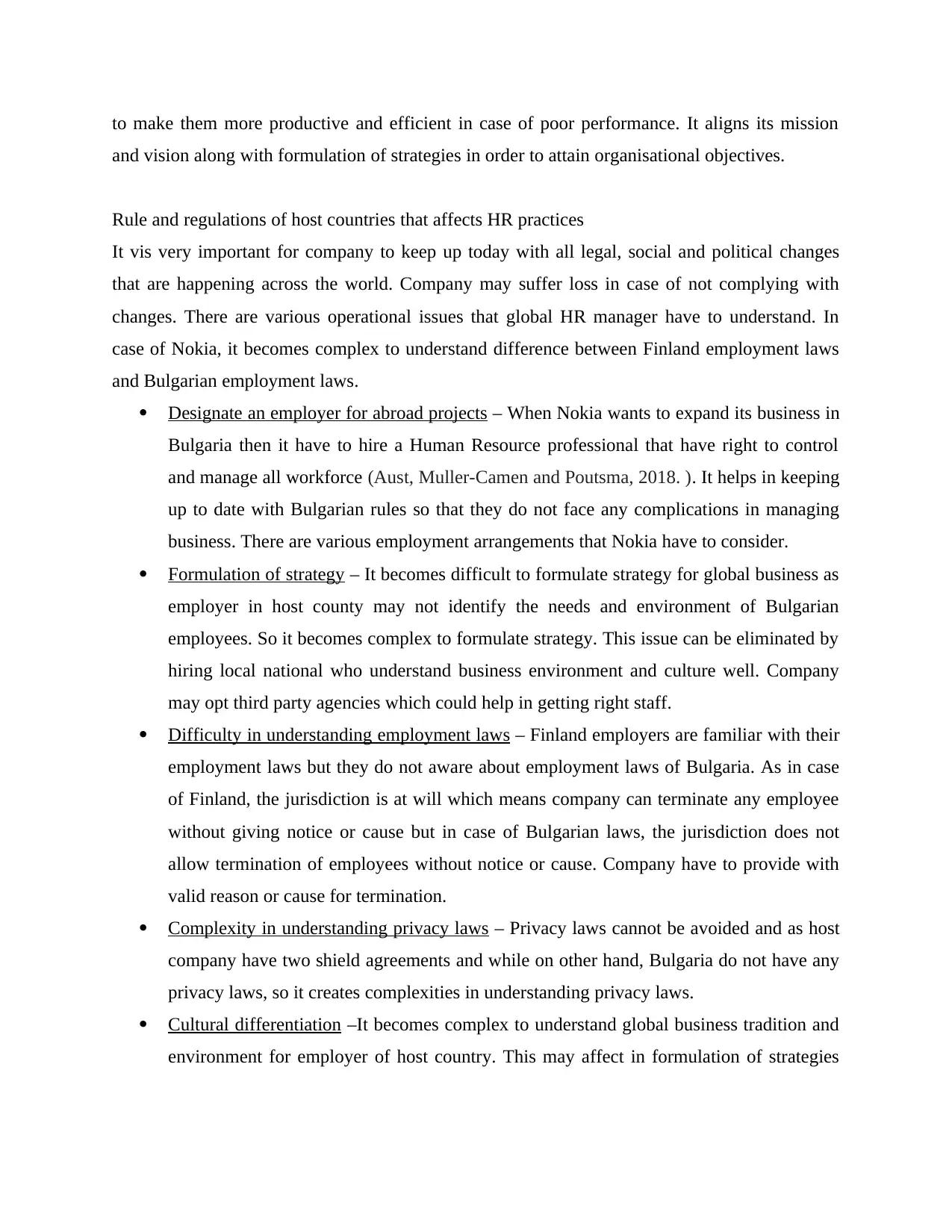
to make them more productive and efficient in case of poor performance. It aligns its mission
and vision along with formulation of strategies in order to attain organisational objectives.
Rule and regulations of host countries that affects HR practices
It vis very important for company to keep up today with all legal, social and political changes
that are happening across the world. Company may suffer loss in case of not complying with
changes. There are various operational issues that global HR manager have to understand. In
case of Nokia, it becomes complex to understand difference between Finland employment laws
and Bulgarian employment laws.
Designate an employer for abroad projects – When Nokia wants to expand its business in
Bulgaria then it have to hire a Human Resource professional that have right to control
and manage all workforce (Aust, Muller-Camen and Poutsma, 2018. ). It helps in keeping
up to date with Bulgarian rules so that they do not face any complications in managing
business. There are various employment arrangements that Nokia have to consider.
Formulation of strategy – It becomes difficult to formulate strategy for global business as
employer in host county may not identify the needs and environment of Bulgarian
employees. So it becomes complex to formulate strategy. This issue can be eliminated by
hiring local national who understand business environment and culture well. Company
may opt third party agencies which could help in getting right staff.
Difficulty in understanding employment laws – Finland employers are familiar with their
employment laws but they do not aware about employment laws of Bulgaria. As in case
of Finland, the jurisdiction is at will which means company can terminate any employee
without giving notice or cause but in case of Bulgarian laws, the jurisdiction does not
allow termination of employees without notice or cause. Company have to provide with
valid reason or cause for termination.
Complexity in understanding privacy laws – Privacy laws cannot be avoided and as host
company have two shield agreements and while on other hand, Bulgaria do not have any
privacy laws, so it creates complexities in understanding privacy laws.
Cultural differentiation –It becomes complex to understand global business tradition and
environment for employer of host country. This may affect in formulation of strategies
and vision along with formulation of strategies in order to attain organisational objectives.
Rule and regulations of host countries that affects HR practices
It vis very important for company to keep up today with all legal, social and political changes
that are happening across the world. Company may suffer loss in case of not complying with
changes. There are various operational issues that global HR manager have to understand. In
case of Nokia, it becomes complex to understand difference between Finland employment laws
and Bulgarian employment laws.
Designate an employer for abroad projects – When Nokia wants to expand its business in
Bulgaria then it have to hire a Human Resource professional that have right to control
and manage all workforce (Aust, Muller-Camen and Poutsma, 2018. ). It helps in keeping
up to date with Bulgarian rules so that they do not face any complications in managing
business. There are various employment arrangements that Nokia have to consider.
Formulation of strategy – It becomes difficult to formulate strategy for global business as
employer in host county may not identify the needs and environment of Bulgarian
employees. So it becomes complex to formulate strategy. This issue can be eliminated by
hiring local national who understand business environment and culture well. Company
may opt third party agencies which could help in getting right staff.
Difficulty in understanding employment laws – Finland employers are familiar with their
employment laws but they do not aware about employment laws of Bulgaria. As in case
of Finland, the jurisdiction is at will which means company can terminate any employee
without giving notice or cause but in case of Bulgarian laws, the jurisdiction does not
allow termination of employees without notice or cause. Company have to provide with
valid reason or cause for termination.
Complexity in understanding privacy laws – Privacy laws cannot be avoided and as host
company have two shield agreements and while on other hand, Bulgaria do not have any
privacy laws, so it creates complexities in understanding privacy laws.
Cultural differentiation –It becomes complex to understand global business tradition and
environment for employer of host country. This may affect in formulation of strategies
Paraphrase This Document
Need a fresh take? Get an instant paraphrase of this document with our AI Paraphraser
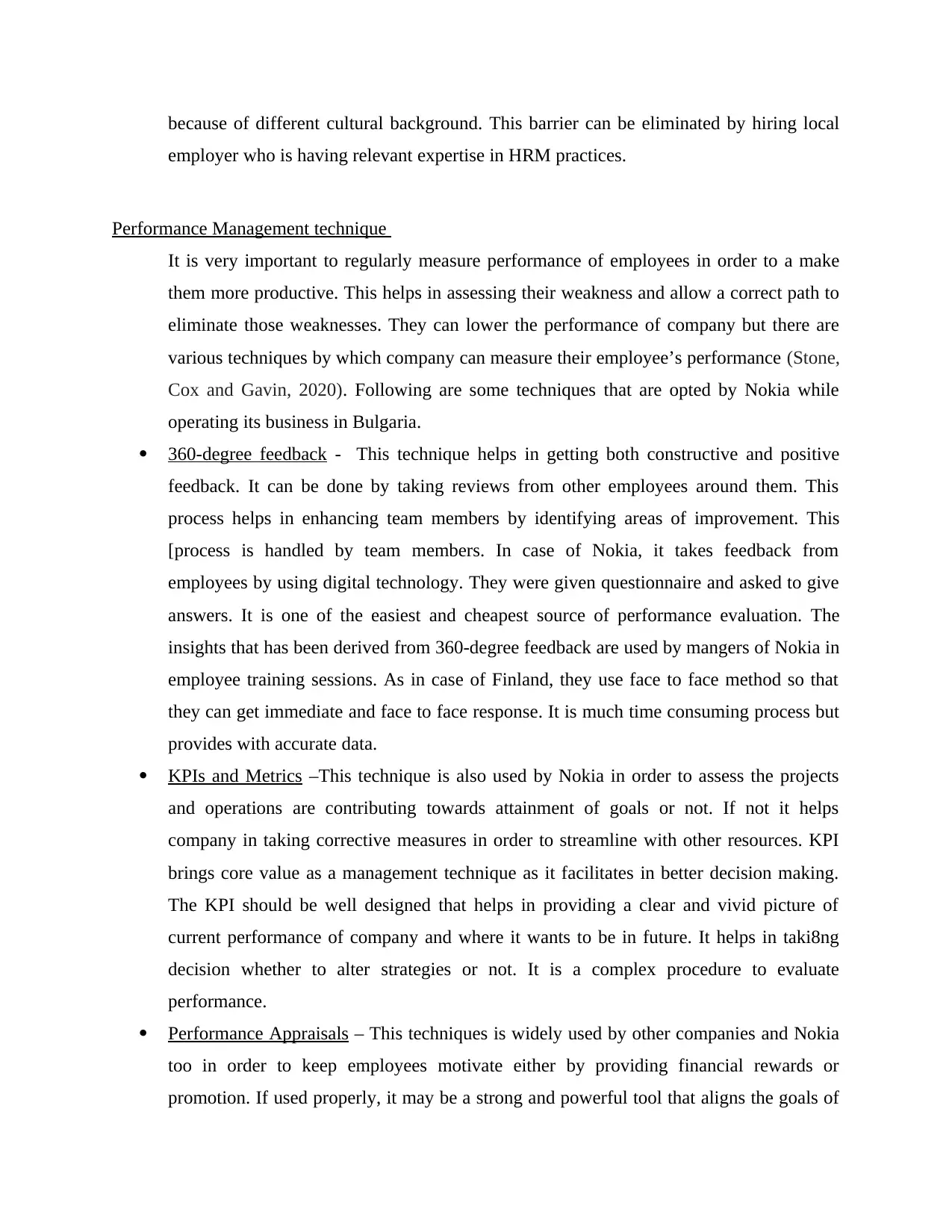
because of different cultural background. This barrier can be eliminated by hiring local
employer who is having relevant expertise in HRM practices.
Performance Management technique
It is very important to regularly measure performance of employees in order to a make
them more productive. This helps in assessing their weakness and allow a correct path to
eliminate those weaknesses. They can lower the performance of company but there are
various techniques by which company can measure their employee’s performance (Stone,
Cox and Gavin, 2020). Following are some techniques that are opted by Nokia while
operating its business in Bulgaria.
360-degree feedback - This technique helps in getting both constructive and positive
feedback. It can be done by taking reviews from other employees around them. This
process helps in enhancing team members by identifying areas of improvement. This
[process is handled by team members. In case of Nokia, it takes feedback from
employees by using digital technology. They were given questionnaire and asked to give
answers. It is one of the easiest and cheapest source of performance evaluation. The
insights that has been derived from 360-degree feedback are used by mangers of Nokia in
employee training sessions. As in case of Finland, they use face to face method so that
they can get immediate and face to face response. It is much time consuming process but
provides with accurate data.
KPIs and Metrics –This technique is also used by Nokia in order to assess the projects
and operations are contributing towards attainment of goals or not. If not it helps
company in taking corrective measures in order to streamline with other resources. KPI
brings core value as a management technique as it facilitates in better decision making.
The KPI should be well designed that helps in providing a clear and vivid picture of
current performance of company and where it wants to be in future. It helps in taki8ng
decision whether to alter strategies or not. It is a complex procedure to evaluate
performance.
Performance Appraisals – This techniques is widely used by other companies and Nokia
too in order to keep employees motivate either by providing financial rewards or
promotion. If used properly, it may be a strong and powerful tool that aligns the goals of
employer who is having relevant expertise in HRM practices.
Performance Management technique
It is very important to regularly measure performance of employees in order to a make
them more productive. This helps in assessing their weakness and allow a correct path to
eliminate those weaknesses. They can lower the performance of company but there are
various techniques by which company can measure their employee’s performance (Stone,
Cox and Gavin, 2020). Following are some techniques that are opted by Nokia while
operating its business in Bulgaria.
360-degree feedback - This technique helps in getting both constructive and positive
feedback. It can be done by taking reviews from other employees around them. This
process helps in enhancing team members by identifying areas of improvement. This
[process is handled by team members. In case of Nokia, it takes feedback from
employees by using digital technology. They were given questionnaire and asked to give
answers. It is one of the easiest and cheapest source of performance evaluation. The
insights that has been derived from 360-degree feedback are used by mangers of Nokia in
employee training sessions. As in case of Finland, they use face to face method so that
they can get immediate and face to face response. It is much time consuming process but
provides with accurate data.
KPIs and Metrics –This technique is also used by Nokia in order to assess the projects
and operations are contributing towards attainment of goals or not. If not it helps
company in taking corrective measures in order to streamline with other resources. KPI
brings core value as a management technique as it facilitates in better decision making.
The KPI should be well designed that helps in providing a clear and vivid picture of
current performance of company and where it wants to be in future. It helps in taki8ng
decision whether to alter strategies or not. It is a complex procedure to evaluate
performance.
Performance Appraisals – This techniques is widely used by other companies and Nokia
too in order to keep employees motivate either by providing financial rewards or
promotion. If used properly, it may be a strong and powerful tool that aligns the goals of
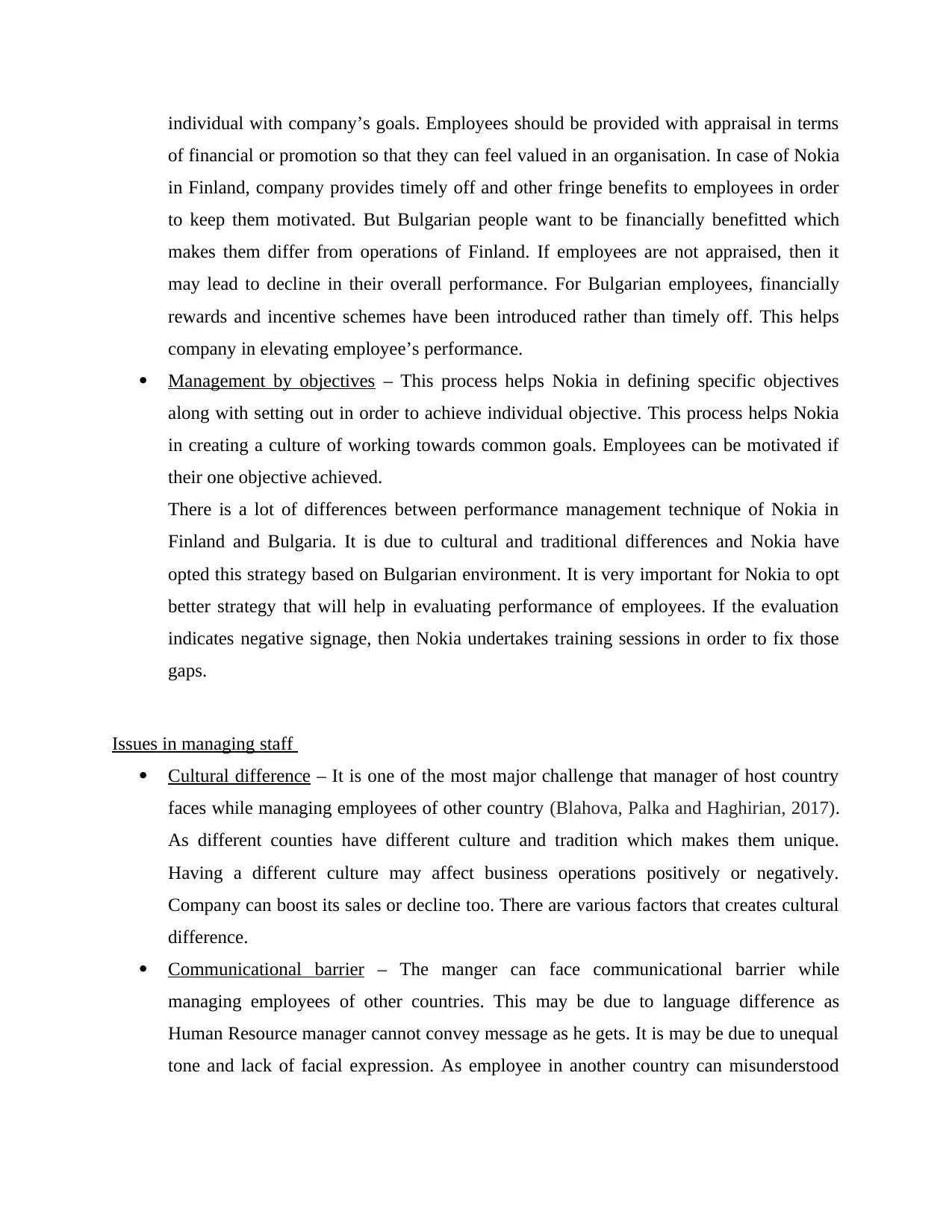
individual with company’s goals. Employees should be provided with appraisal in terms
of financial or promotion so that they can feel valued in an organisation. In case of Nokia
in Finland, company provides timely off and other fringe benefits to employees in order
to keep them motivated. But Bulgarian people want to be financially benefitted which
makes them differ from operations of Finland. If employees are not appraised, then it
may lead to decline in their overall performance. For Bulgarian employees, financially
rewards and incentive schemes have been introduced rather than timely off. This helps
company in elevating employee’s performance.
Management by objectives – This process helps Nokia in defining specific objectives
along with setting out in order to achieve individual objective. This process helps Nokia
in creating a culture of working towards common goals. Employees can be motivated if
their one objective achieved.
There is a lot of differences between performance management technique of Nokia in
Finland and Bulgaria. It is due to cultural and traditional differences and Nokia have
opted this strategy based on Bulgarian environment. It is very important for Nokia to opt
better strategy that will help in evaluating performance of employees. If the evaluation
indicates negative signage, then Nokia undertakes training sessions in order to fix those
gaps.
Issues in managing staff
Cultural difference – It is one of the most major challenge that manager of host country
faces while managing employees of other country (Blahova, Palka and Haghirian, 2017).
As different counties have different culture and tradition which makes them unique.
Having a different culture may affect business operations positively or negatively.
Company can boost its sales or decline too. There are various factors that creates cultural
difference.
Communicational barrier – The manger can face communicational barrier while
managing employees of other countries. This may be due to language difference as
Human Resource manager cannot convey message as he gets. It is may be due to unequal
tone and lack of facial expression. As employee in another country can misunderstood
of financial or promotion so that they can feel valued in an organisation. In case of Nokia
in Finland, company provides timely off and other fringe benefits to employees in order
to keep them motivated. But Bulgarian people want to be financially benefitted which
makes them differ from operations of Finland. If employees are not appraised, then it
may lead to decline in their overall performance. For Bulgarian employees, financially
rewards and incentive schemes have been introduced rather than timely off. This helps
company in elevating employee’s performance.
Management by objectives – This process helps Nokia in defining specific objectives
along with setting out in order to achieve individual objective. This process helps Nokia
in creating a culture of working towards common goals. Employees can be motivated if
their one objective achieved.
There is a lot of differences between performance management technique of Nokia in
Finland and Bulgaria. It is due to cultural and traditional differences and Nokia have
opted this strategy based on Bulgarian environment. It is very important for Nokia to opt
better strategy that will help in evaluating performance of employees. If the evaluation
indicates negative signage, then Nokia undertakes training sessions in order to fix those
gaps.
Issues in managing staff
Cultural difference – It is one of the most major challenge that manager of host country
faces while managing employees of other country (Blahova, Palka and Haghirian, 2017).
As different counties have different culture and tradition which makes them unique.
Having a different culture may affect business operations positively or negatively.
Company can boost its sales or decline too. There are various factors that creates cultural
difference.
Communicational barrier – The manger can face communicational barrier while
managing employees of other countries. This may be due to language difference as
Human Resource manager cannot convey message as he gets. It is may be due to unequal
tone and lack of facial expression. As employee in another country can misunderstood
⊘ This is a preview!⊘
Do you want full access?
Subscribe today to unlock all pages.

Trusted by 1+ million students worldwide
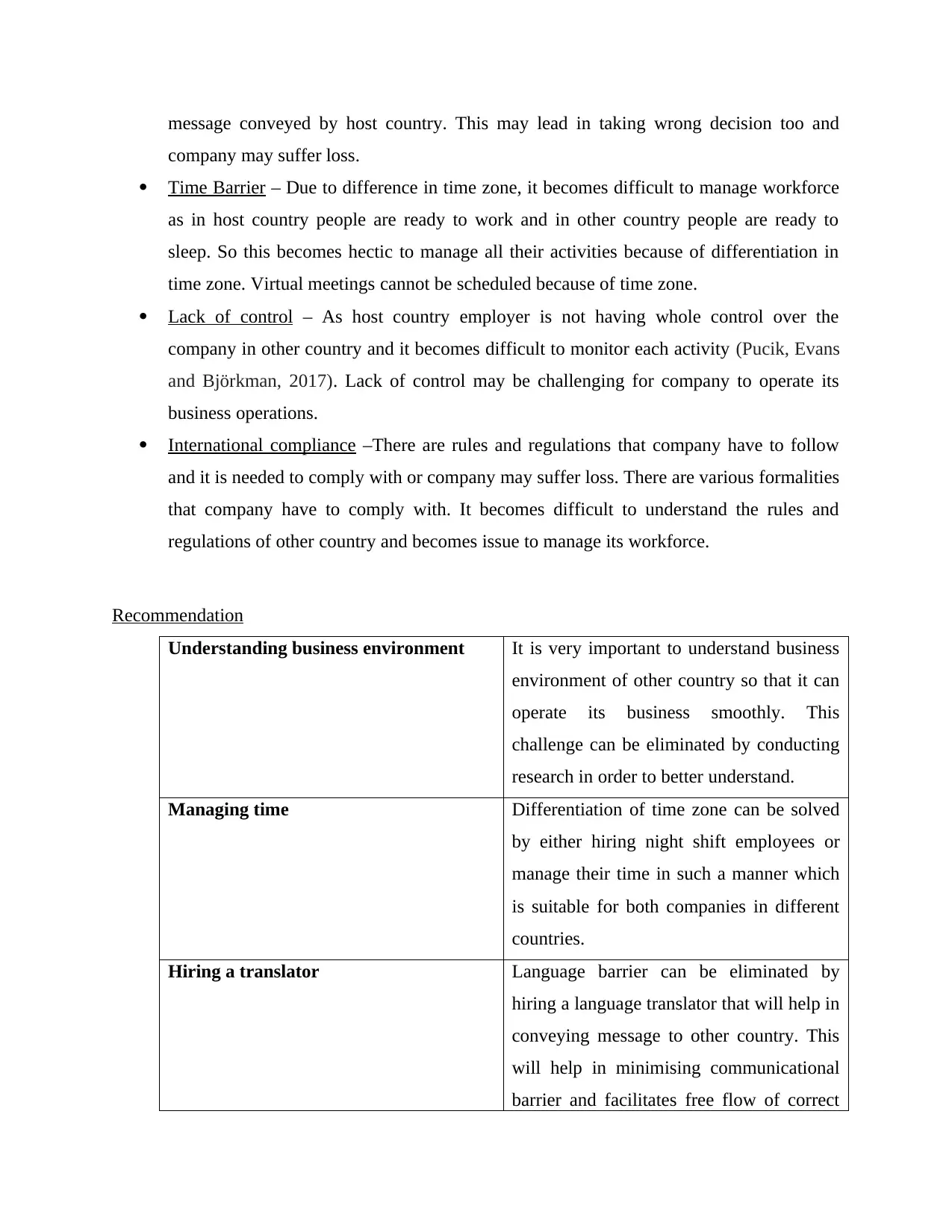
message conveyed by host country. This may lead in taking wrong decision too and
company may suffer loss.
Time Barrier – Due to difference in time zone, it becomes difficult to manage workforce
as in host country people are ready to work and in other country people are ready to
sleep. So this becomes hectic to manage all their activities because of differentiation in
time zone. Virtual meetings cannot be scheduled because of time zone.
Lack of control – As host country employer is not having whole control over the
company in other country and it becomes difficult to monitor each activity (Pucik, Evans
and Björkman, 2017). Lack of control may be challenging for company to operate its
business operations.
International compliance –There are rules and regulations that company have to follow
and it is needed to comply with or company may suffer loss. There are various formalities
that company have to comply with. It becomes difficult to understand the rules and
regulations of other country and becomes issue to manage its workforce.
Recommendation
Understanding business environment It is very important to understand business
environment of other country so that it can
operate its business smoothly. This
challenge can be eliminated by conducting
research in order to better understand.
Managing time Differentiation of time zone can be solved
by either hiring night shift employees or
manage their time in such a manner which
is suitable for both companies in different
countries.
Hiring a translator Language barrier can be eliminated by
hiring a language translator that will help in
conveying message to other country. This
will help in minimising communicational
barrier and facilitates free flow of correct
company may suffer loss.
Time Barrier – Due to difference in time zone, it becomes difficult to manage workforce
as in host country people are ready to work and in other country people are ready to
sleep. So this becomes hectic to manage all their activities because of differentiation in
time zone. Virtual meetings cannot be scheduled because of time zone.
Lack of control – As host country employer is not having whole control over the
company in other country and it becomes difficult to monitor each activity (Pucik, Evans
and Björkman, 2017). Lack of control may be challenging for company to operate its
business operations.
International compliance –There are rules and regulations that company have to follow
and it is needed to comply with or company may suffer loss. There are various formalities
that company have to comply with. It becomes difficult to understand the rules and
regulations of other country and becomes issue to manage its workforce.
Recommendation
Understanding business environment It is very important to understand business
environment of other country so that it can
operate its business smoothly. This
challenge can be eliminated by conducting
research in order to better understand.
Managing time Differentiation of time zone can be solved
by either hiring night shift employees or
manage their time in such a manner which
is suitable for both companies in different
countries.
Hiring a translator Language barrier can be eliminated by
hiring a language translator that will help in
conveying message to other country. This
will help in minimising communicational
barrier and facilitates free flow of correct
Paraphrase This Document
Need a fresh take? Get an instant paraphrase of this document with our AI Paraphraser
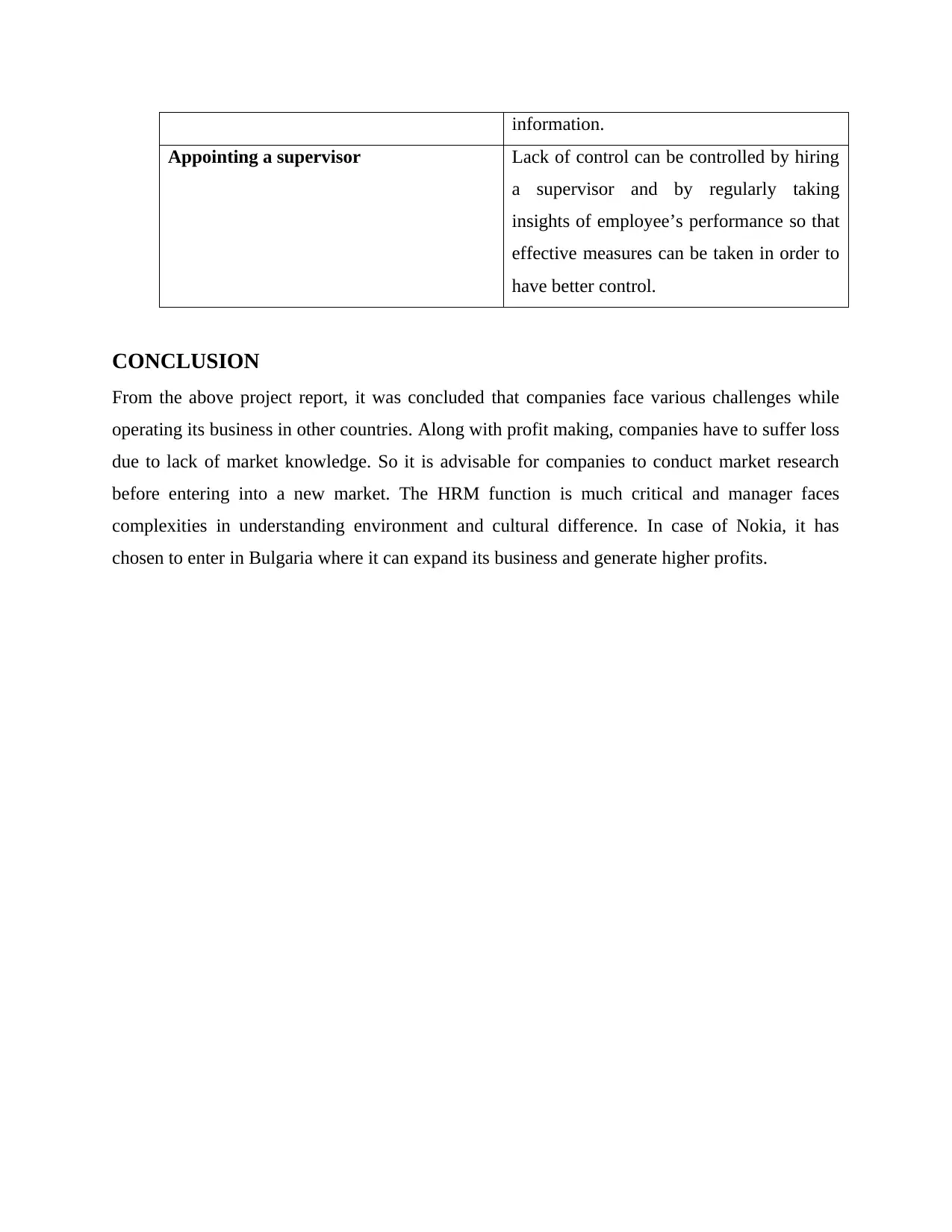
information.
Appointing a supervisor Lack of control can be controlled by hiring
a supervisor and by regularly taking
insights of employee’s performance so that
effective measures can be taken in order to
have better control.
CONCLUSION
From the above project report, it was concluded that companies face various challenges while
operating its business in other countries. Along with profit making, companies have to suffer loss
due to lack of market knowledge. So it is advisable for companies to conduct market research
before entering into a new market. The HRM function is much critical and manager faces
complexities in understanding environment and cultural difference. In case of Nokia, it has
chosen to enter in Bulgaria where it can expand its business and generate higher profits.
Appointing a supervisor Lack of control can be controlled by hiring
a supervisor and by regularly taking
insights of employee’s performance so that
effective measures can be taken in order to
have better control.
CONCLUSION
From the above project report, it was concluded that companies face various challenges while
operating its business in other countries. Along with profit making, companies have to suffer loss
due to lack of market knowledge. So it is advisable for companies to conduct market research
before entering into a new market. The HRM function is much critical and manager faces
complexities in understanding environment and cultural difference. In case of Nokia, it has
chosen to enter in Bulgaria where it can expand its business and generate higher profits.
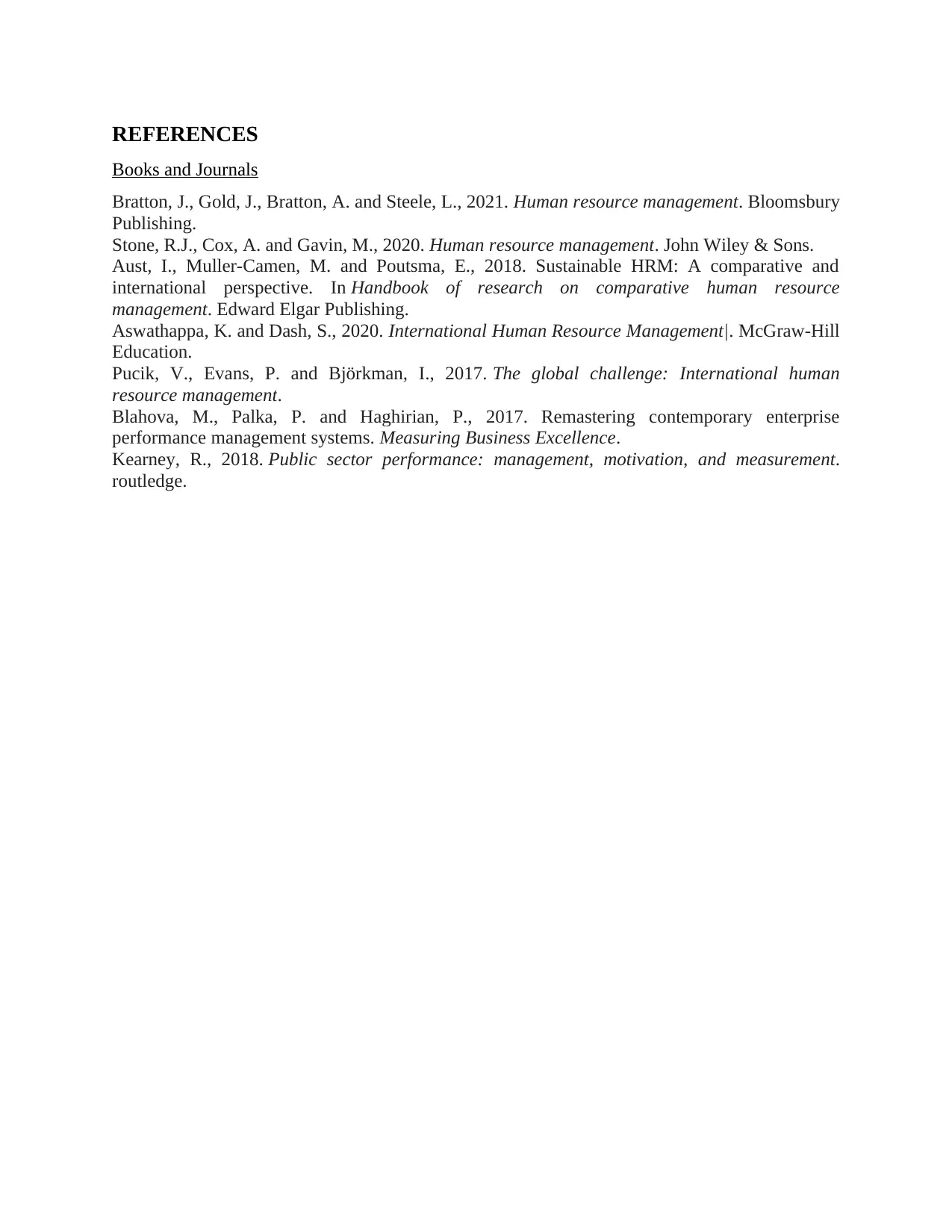
REFERENCES
Books and Journals
Bratton, J., Gold, J., Bratton, A. and Steele, L., 2021. Human resource management. Bloomsbury
Publishing.
Stone, R.J., Cox, A. and Gavin, M., 2020. Human resource management. John Wiley & Sons.
Aust, I., Muller-Camen, M. and Poutsma, E., 2018. Sustainable HRM: A comparative and
international perspective. In Handbook of research on comparative human resource
management. Edward Elgar Publishing.
Aswathappa, K. and Dash, S., 2020. International Human Resource Management|. McGraw-Hill
Education.
Pucik, V., Evans, P. and Björkman, I., 2017. The global challenge: International human
resource management.
Blahova, M., Palka, P. and Haghirian, P., 2017. Remastering contemporary enterprise
performance management systems. Measuring Business Excellence.
Kearney, R., 2018. Public sector performance: management, motivation, and measurement.
routledge.
Books and Journals
Bratton, J., Gold, J., Bratton, A. and Steele, L., 2021. Human resource management. Bloomsbury
Publishing.
Stone, R.J., Cox, A. and Gavin, M., 2020. Human resource management. John Wiley & Sons.
Aust, I., Muller-Camen, M. and Poutsma, E., 2018. Sustainable HRM: A comparative and
international perspective. In Handbook of research on comparative human resource
management. Edward Elgar Publishing.
Aswathappa, K. and Dash, S., 2020. International Human Resource Management|. McGraw-Hill
Education.
Pucik, V., Evans, P. and Björkman, I., 2017. The global challenge: International human
resource management.
Blahova, M., Palka, P. and Haghirian, P., 2017. Remastering contemporary enterprise
performance management systems. Measuring Business Excellence.
Kearney, R., 2018. Public sector performance: management, motivation, and measurement.
routledge.
⊘ This is a preview!⊘
Do you want full access?
Subscribe today to unlock all pages.

Trusted by 1+ million students worldwide
1 out of 9
Related Documents
Your All-in-One AI-Powered Toolkit for Academic Success.
+13062052269
info@desklib.com
Available 24*7 on WhatsApp / Email
![[object Object]](/_next/static/media/star-bottom.7253800d.svg)
Unlock your academic potential
Copyright © 2020–2026 A2Z Services. All Rights Reserved. Developed and managed by ZUCOL.





